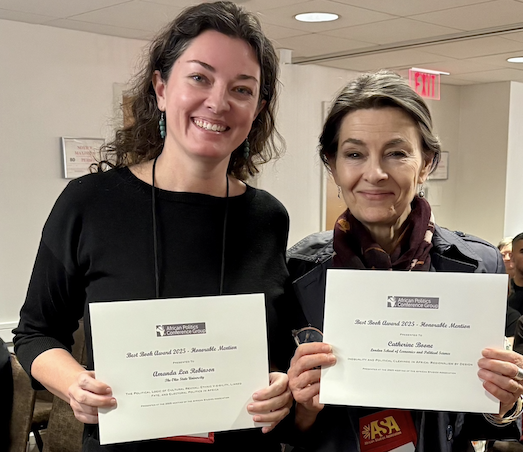Jens Meierhenrich Wins the Best Book Award 2025

Winner:
Jens Meierhenrich, The Violence of Law: The Formation and Deformation of Gacaca Courts in Rwanda
In TheViolence of Law: The Formation and Deformation of Gacaca Courts in Rwanda,Jens Meierhenrich offers a powerful reexamination of the Gacaca courts, a neotraditional justice system repurposed to administer transitional justice after the 1994 genocide. Using the conceptual framework of lawfare, defined as the “strategy of conflict that centrally revolves around the systematic use of legal norms and institutions for political ends,” Meierhenrich demonstrates how these courts—previously praised by many in the international community—were instrumentalized by the new ruling regime to instill fear, consolidate state power, and project the illusion of justice.
Through analytic ethnography and an impressive breadth of empirical evidence, including direct observation of Gacaca proceedings, visual ethnography, elite interviews, and archival research, Meierhenrich provides a granular and compelling account of how these courts were designed and deployed as instruments of repression.Further, the book’s erudite prose sharpens the narrative, illuminating how“gacaca courts were formed and deformed”, while placing the analysis in conversation with broader social scientific debates.
This book makes several exceptional contributions to the field. It offers a level of depth and detail that are rare in post-genocide Rwanda, challenging uncritical narratives of the genocide and its aftermath. It significantly advances scholarship on formal institutions and political outcomes by illustrating how lawfare can operate within transitional justice settings. Finally, it deepens our understanding of authoritarian regimes by revealing how new governments can weaponize a legal system to entrench their authority.
For all these reasons, we believe that the book will profoundly impact debates inAfrican politics, transitional justice, and judicial politics. Meierhenrich’s work is an outstanding contribution deserving of the Best Book Award.
Honorable mentions
1. Catherine Boone, Inequality and Political Cleavage in Africa: Regionalism by Design (CambridgeUniversity Press)
2. Amanda Lea Robinson, ThePolitical Logic of Cultural Revival: Ethnic Visibility, Linked Fate, andElectoral Politics in Africa (Oxford University Press)
In Inequality andPolitical Cleavage in Africa: Regionalism by Design, Catherine Boone begins by showing that many African countries are characterized by high spatial economic inequality. This inequality, she argues, is the result of regional economic cleavages often stemming from sectoral specialization in crops during the colonial period, such as groundnuts in Mali and cotton in Tanzania. In turn, she finds that these regional economic cleavages have created persistent voting blocs after independence.
To support her argument,Boone amasses and analyzes an impressive amount of spatial data from a dozenAfrican countries to illustrate her argument. In emphasizing regional differences in crops and otherwise material conditions, Boone explicitly provides a corrective to the very extensive literature focusing on ethnicity as the main political cleavage in Africa. In some cases, Boone argues, the formation of ethnic groups is endogenous to regional economic differentiation.As a result, ethnic cleavages can be epiphenomenal to economic ones.
In The PoliticalLogic of Cultural Revival: Ethnic Visibility, Linked Fate, and Electoral
Politics in Africa, Amanda Robinson shows that political leaders of Lhomwe ethnicity, one of the largest ethnic groups inMalawi, have engaged in a cultural revival in the last two decades that includes attempts to increase the use of the their language, names, dances, and other cultural practices. Lhomwe leaders commonly argue that the goals of the revival are solely cultural and intended to compensate for the historical discrimination that the Lhomwe did experience in the 20th century during and after colonial rule. However, Robinson argues that there is a political logic behind the cultural revival: by increasing ethnic visibility through the adoption of cultural practices, the leaders of the cultural revival hope to increase their political support.
Robinson deftly combines observational data, a survey experiment, and interviews, all informed by an expert knowledge of Malawi, to show the promise—and the limits—of political returns to cultural revivals. Finally, Robinson’s engagement with some of the broader literature on culture in the social sciences allows her to provide a fuller understanding of political mobilization than standard accounts of ethnic politics allow.
Boone and Robinson approach the question of political mobilization from different angles. The former focuses on material differences while the latter on cultural and symbolic ones. However, both show the importance of moving beyond understandings of political mobilization that are limited to ethnicity in a narrow sense. In this way, the committee believes that the two books are complementary and wants to recognize their combined contribution to the understanding of African politics.


.svg)

.svg)